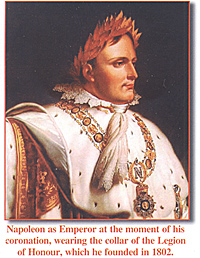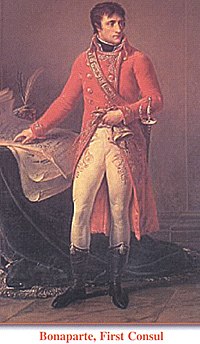Napoleon Bonaparte
First Consul and Emperor
by Ben Weider, CM, CQ, SBStJ, Ph.D, Canada
| |
Napoleon as Emperor at the moment of his coronation, wearing the collar of the Legion of Honour, which he founded in 1802.
The people of France elected Napoleon as the Emperor, because he saved France from its enemies and he defended the gains of the Revolution at home. Napoleon established both the Bank of France and the French bourse (stock exchange) as well as National and Departmental Tax Boards, to insure equitable taxation for all. Consequently, the income of the French peasants skyrocketed.
Napoleon established awards such as the “Legion of Honour” to reward those whose services to the nation merited special recognition; the recipient could be scientist, composer, legislator, clergyman, writer, as well as a soldier.
In the area of public works, over 20,000 miles of imperial and 12,000 miles of regional roads were completed, almost a thousand miles of canals were build, the Great Cornice road was constructed along the Mediterranean coast, mountain roads were constructed across the Alps by ways of Simplon Pass and Mont. Cenis, and harbours were dredged and expanded at many ports, including Dunkerque and Cherbourg.
Not only was Paris beautified with the construction of boulevards, bridges and monuments, but the National Archives received a permanent home. Napoleon also saved the Louvre.
Monument buildings were constructed throughout the Empire and structures, such as the Imperial Cathedral of Speyer, made famous by Luther, were preserved while work on the spires of the great cathedral of Cologne were continued on Napoleon's orders. In fact, Napoleon's architectural handiwork can be found scattered across Europe, from Rome to Vienna. “Think tanks” and research centres were established in France to work on projects vital for national economy. An Industrial Board was organized to provide data and information to French Industry, as exemplified by the success of the sugar beet farming and the canning industry.
For religion, Napoleon ended the schism and restored the Catholic Church to France by the Concordat in 1801. He insured freedom of religions and equality to the Protestant sects, and he declared France the homeland of the Jews, after it became obvious he could not establish their national home in Palestine. The Code Napoleon established equality before the law, emphasized the sanctity of the
family, and assured the legal gains of the Revolution.
The Code of Civil Procedure insured widespread user of mediation in the courts and the laws, and the courts were secularised. Napoleon as Emperor at the moment of his coronation, wearing the collar of the Legion of Honour, which he founded in 1802. Napoleon created the Imperial University to administer French Education. Specialized engineering and technological schools were established along with the famous lycées to insure a scientific education. The establishment of a Professional School of Midwifery and first School of Obstetrics were formed during the consulate and the School of Veterinary Science was professionalised under Napoleon.
In the military, Napoleon pioneered in what we describe today as the “principles of war” which are studied by almost every military academy in the world. The armies of today are based on the organization created by Napoleon for his Grand Army and it has been used ever since.
Many historians claim that Napoleon created his own legend on St. Helena. The truth is that his legend started in Toulon in 1793. Lord Holland, speaking in the British House of Peers, spoke about the deceased Emperor in August 1833. He stated: “The very people who detested this great man have acknowledged that for 10 centuries there has not appeared upon earth a more extraordinary ‘character’.”
This is indeed a tribute to the Emperor.
THE TRUTH GOES THROUGH THREE STAGES
It is easy to succumb to the temptation of quoting recognized authorities and get information from secondary sources rather than do primary research. A quote from a written document made by
one historian and uncritically repeated by another soon acquires the authority of “Common Knowledge”. This research did not rely on accepted HISTORIAN EVALUATION, but on primary
research.
THE PURSUIT OF FACTUAL DETAIL IS THE RELIGION OF PERFECTION THE TRUTH IS INCONTROVERTI-BLE MALICE MAY ATTACK IT AND IGNORANCE MAY DERIDE IT, BUT IN THE END IT IS ACCEPTED.
Bonaparte, First Consul
To save France and the Republic, Bonaparte set about working 20 hours a day, in other words, 140 hours a week. Going to bed at 8p.m. and getting up at midnight: this was the regimen he imposed on himself in the first months of the consulate.
And he performed miracles that have never been matched anywhere in the world, before or since. In 1802, France was once more prosperous, law-abiding and at peace. The French people, united, had regained their enthusiasm, hope, desire to work and joy of living. This was the “Golden Age of the Consulate.”
Napoleon would have liked this age to last forever. He would have wished all the nations of Europe, particularly England and France, to work peacefully hand in hand toward improving the lot of their respective populations. This goal would certainly have been achieved if Fox had remained in power in London. Alas, in 1803, William Pitt once more became Prime Minister and immediately declared war on the French Republic.
William Pitt was solely responsible for the wars that “perfidious Albion” succeeded in dubbing “the Napoleonic wars,” which in reality were the wars of the absolute monarchies against France, the home of the human rights. Before presenting a few of the achievements of the First Consul of the Republic and of the Emperor of the French people, let us quote a few of his words. (Extract from the memoir from St. Helena)
I have closed the gulf of anarchy and cleared away chaos. I have purified the Revolution and ennobled the people. I have stimulated competition, rewarded the deserving, and expanded the limits of glory!
All that is surely something! And so, what could they accuse me of that the historian could not defend me for doing? Could it be my intentions? But he will demonstrate that they always sought the public good.
Could it be my despotism? But he will demonstrate that firm authority was an absolute necessity.
Will they say that I restricted freedom? But he will prove that license, anarchy, and civil disorder were ever-present threats. Will they accuse me of liking war too much? But he will show that it was always I who was attacked.
Will they accuse me of wanting universal monarchy? But he will show that it was only the chance product of circumstances; it was our enemies themselves who, step by step, led me to that. Finally, will they say it was my ambition? Oh, they will definitely discover that I was guilty of ambition, but of the highest and the greatest kind that can exist! The ambition to establish and finally to consecrate the empire
of reason and the full exercise and enjoyment of all the human faculties.
And here the historian will find himself bound to regret that this ambition was never fully realized. This, in very few words, resumes my entire history." The point needs to be made that Napoleon was constantly hindered in his peaceful enterprises by repeated attacks from the old European monarchies, goaded on by the English oligarchy, whose aim was to achieve sole domination of the entire world.
William Pitt and his successors resorted to every possible means in their pursuit of this end. They used their gold to finance seven coalitions against France; they sponsored assassinations, including that of Tsar Paul I, and were behind numerous failed assassinations, most notably against First Consul Bonaparte. They even carried out large-scale massacres of civilian populations, such as the one in Copenhagen on Sept. 2, 1807.
Napoleon, on the other hand, had always wanted peace. Although he won several battles, in each instance it was to defend France from foreign attack. Nor did he ever resort to ignoble means. Possessing ample evidence of the assassination attempts mounted against him by William Pitt and the Comte D’Artois, he would have been justified in paying them back in kind. He never did so. On the contrary, he always forgave his enemies when they were at his mercy, even to the point of seeming rather naïve in such a Machiavellian world. The saying “he was too kind-hearted for his own good” was never truer than of Napoleon.
Napoleon Bonaparte
|
 If ever a ruler owed his position to what is called the “will of the people”, Napoleon did. Napoleon won it by his success with the sword, not the sword of execution, nor the sword of the guillotine, but the sword of battle against the enemies of France.
If ever a ruler owed his position to what is called the “will of the people”, Napoleon did. Napoleon won it by his success with the sword, not the sword of execution, nor the sword of the guillotine, but the sword of battle against the enemies of France.
 When Napoleon came to power in November 1799, following the coup d’état of 18 brumaire organized by the Abbé Sieyès, France was in total ruin, and on the brink of anarchy. Civil War was raging in Vendée and Brittany. In Italy, the Austrians, under the second coalition between England and Austria, were in the process of reconquering the entire North of the country and were preparing to invade the French Riviera prior to marching on Paris and restoring the Bourbons to the throne.
When Napoleon came to power in November 1799, following the coup d’état of 18 brumaire organized by the Abbé Sieyès, France was in total ruin, and on the brink of anarchy. Civil War was raging in Vendée and Brittany. In Italy, the Austrians, under the second coalition between England and Austria, were in the process of reconquering the entire North of the country and were preparing to invade the French Riviera prior to marching on Paris and restoring the Bourbons to the throne.